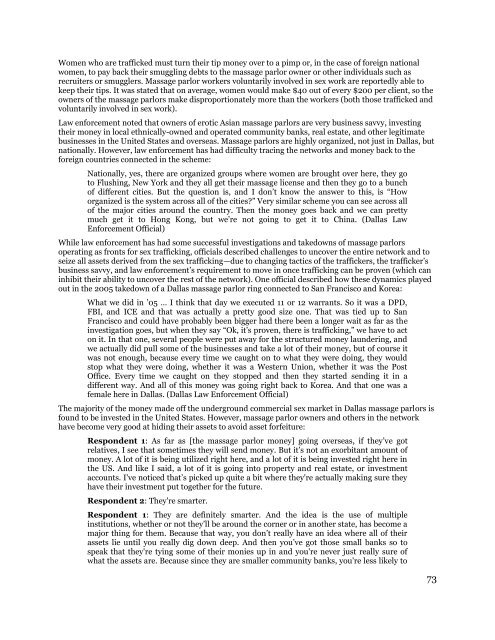413047-Underground-Commercial-Sex-Economy
413047-Underground-Commercial-Sex-Economy
413047-Underground-Commercial-Sex-Economy
Create successful ePaper yourself
Turn your PDF publications into a flip-book with our unique Google optimized e-Paper software.
Women who are trafficked must turn their tip money over to a pimp or, in the case of foreign national<br />
women, to pay back their smuggling debts to the massage parlor owner or other individuals such as<br />
recruiters or smugglers. Massage parlor workers voluntarily involved in sex work are reportedly able to<br />
keep their tips. It was stated that on average, women would make $40 out of every $200 per client, so the<br />
owners of the massage parlors make disproportionately more than the workers (both those trafficked and<br />
voluntarily involved in sex work).<br />
Law enforcement noted that owners of erotic Asian massage parlors are very business savvy, investing<br />
their money in local ethnically-owned and operated community banks, real estate, and other legitimate<br />
businesses in the United States and overseas. Massage parlors are highly organized, not just in Dallas, but<br />
nationally. However, law enforcement has had difficulty tracing the networks and money back to the<br />
foreign countries connected in the scheme:<br />
Nationally, yes, there are organized groups where women are brought over here, they go<br />
to Flushing, New York and they all get their massage license and then they go to a bunch<br />
of different cities. But the question is, and I don’t know the answer to this, is “How<br />
organized is the system across all of the cities” Very similar scheme you can see across all<br />
of the major cities around the country. Then the money goes back and we can pretty<br />
much get it to Hong Kong, but we’re not going to get it to China. (Dallas Law<br />
Enforcement Official)<br />
While law enforcement has had some successful investigations and takedowns of massage parlors<br />
operating as fronts for sex trafficking, officials described challenges to uncover the entire network and to<br />
seize all assets derived from the sex trafficking—due to changing tactics of the traffickers, the trafficker’s<br />
business savvy, and law enforcement’s requirement to move in once trafficking can be proven (which can<br />
inhibit their ability to uncover the rest of the network). One official described how these dynamics played<br />
out in the 2005 takedown of a Dallas massage parlor ring connected to San Francisco and Korea:<br />
What we did in ’05 … I think that day we executed 11 or 12 warrants. So it was a DPD,<br />
FBI, and ICE and that was actually a pretty good size one. That was tied up to San<br />
Francisco and could have probably been bigger had there been a longer wait as far as the<br />
investigation goes, but when they say “Ok, it’s proven, there is trafficking,” we have to act<br />
on it. In that one, several people were put away for the structured money laundering, and<br />
we actually did pull some of the businesses and take a lot of their money, but of course it<br />
was not enough, because every time we caught on to what they were doing, they would<br />
stop what they were doing, whether it was a Western Union, whether it was the Post<br />
Office. Every time we caught on they stopped and then they started sending it in a<br />
different way. And all of this money was going right back to Korea. And that one was a<br />
female here in Dallas. (Dallas Law Enforcement Official)<br />
The majority of the money made off the underground commercial sex market in Dallas massage parlors is<br />
found to be invested in the United States. However, massage parlor owners and others in the network<br />
have become very good at hiding their assets to avoid asset forfeiture:<br />
Respondent 1: As far as [the massage parlor money] going overseas, if they’ve got<br />
relatives, I see that sometimes they will send money. But it’s not an exorbitant amount of<br />
money. A lot of it is being utilized right here, and a lot of it is being invested right here in<br />
the US. And like I said, a lot of it is going into property and real estate, or investment<br />
accounts. I've noticed that’s picked up quite a bit where they're actually making sure they<br />
have their investment put together for the future.<br />
Respondent 2: They're smarter.<br />
Respondent 1: They are definitely smarter. And the idea is the use of multiple<br />
institutions, whether or not they’ll be around the corner or in another state, has become a<br />
major thing for them. Because that way, you don’t really have an idea where all of their<br />
assets lie until you really dig down deep. And then you’ve got those small banks so to<br />
speak that they're tying some of their monies up in and you're never just really sure of<br />
what the assets are. Because since they are smaller community banks, you're less likely to<br />
73


